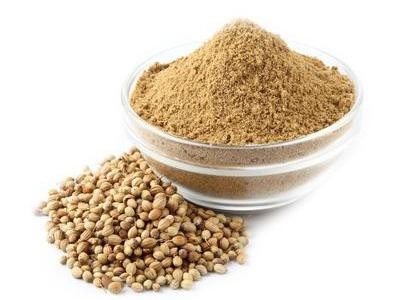Packaging: 90 g (or 500 g & 1 kg) containing coriander (also known as cilantro) powder.
(Price includes VAT.)
Coriander is a spice with many therapeutic properties. Its seeds are small, round, and brown. The seeds, leaves, and even the roots of coriander are edible and have very distinct flavors and uses. Coriander contains rich amounts of vitamins A, C, and K, folic acid, iron, calcium, magnesium, and potassium, as well as trace amounts of niacin, B vitamins, and zinc.
Coriander has many names, some of which are coriander, cilantro, Chinese parsley, and coriander seeds!
It is an aromatic herb whose leaves and fruits are used in cooking, medicine, and confectionery.
It belongs to the same family as parsley and resembles parsley; some even call it "Chinese parsley," while its flavor is reminiscent of celery. This is a herb whose all parts are useful, from the roots and leaves to the dried seeds.
The term "coriander" in food preparation can refer specifically to the seeds (as a spice), rather than the whole plant. When crushed, the seeds have a citrusy flavor due to the terpenes, linalool, and pinene. It is characterized as warm, spicy, and orange-flavored.
Nutritional Profile:
The nutritional profile of coriander differs from that of fresh shoots and leaves. The leaves are particularly rich in vitamins A, C, and K, with moderate content of dietary minerals.
Although the seeds generally have lower vitamin content, they provide significant amounts of dietary fiber, calcium, selenium, iron, magnesium, and manganese.
Therapeutic Properties:
Coriander is thought to balance blood sugar levels and help combat anxiety, migraines, fatigue, and anorexia.
Coriander aids the digestive system and stimulates appetite. It reduces bloating and facilitates digestion.
It is also considered stimulating and positively affects the nervous system.
Coriander has the ability to neutralize microbes such as salmonella, which is a cause of food poisoning.
Sauces and dietary products containing coriander can neutralize microbes.
One property of coriander is its ability to reduce menstrual cramps.
It strengthens the immune system, and thanks to its high iron content, helps combat anemia.
It addresses respiratory problems.
Drink a tea made with a handful of coriander leaves per cup of water. This will help expel mucus from the lungs, throat, and nose.
Coriander can be used to treat diarrhea when caused by fungi or bacteria.
It reduces levels of bad cholesterol in the blood and helps eliminate accumulated fat from the inner walls of veins and arteries, preventing heart attacks.
It reduces inflammation caused by rheumatism and arthritis, two very painful and degenerative diseases.
It addresses kidney problems, from fluid retention to kidney stones.
It combats anemia due to its high iron content. It is ideal for individuals with iron deficiency. The best way to consume it is raw in salads, in tea, finely chopped as an addition to soups, creams, or sauces.
It treats conjunctivitis. Coriander, being an excellent disinfectant, can be used to treat various ailments, including conjunctivitis. It is also used for treating macular degeneration and other stress-related factors affecting vision.
It can also be used for treating minor eye injuries. Make a tea with a handful of coriander leaves and a cup of boiling water. Once cooled, soak some cotton in the liquid and dab it over your eye.
Coriander helps improve the health and function of the liver, pancreas, lungs, stomach, and endocrine glands.
Coriander contributes, among other things, to combating anxiety.
It helps regulate blood sugar levels and addresses fatigue and migraines.
It aids women who experience issues with milk production after childbirth (for example, those who have had a cesarean) to try drinking coriander tea.
It is good for alleviating symptoms of liver insufficiency, cleansing the body of bacteria, and removing LDL, the bad cholesterol from the blood.
Soothe stomach pain by making a decoction of coriander. The tea made with coriander seeds helps digestion when consumed after meals. Simply boil one teaspoon of coriander seeds in a cup of water for ten minutes and strain the mixture. Drink a cup after each meal.
It can also relieve intestinal colic. It is antiseptic, detoxifying, and analgesic.
Treat bloating with coriander decoction.
Whenever you suffer from bloating and burping, put half a teaspoon of coriander seeds in a cup of hot water, let it steep for 10 minutes, and drink it. You will soon relieve your discomfort, as this herb is known for its digestive and antispasmodic properties.
Its external use also seems to reduce muscle pain and joint pain in cases of rheumatism and arthritis. It is diuretic, antifungal, fat-dissolving, and revitalizing.
In the Kitchen
The leaves and seeds of coriander are particularly popular, especially in Asian and Mexican cuisine, as they are commonly used in salads, soups, marinades, and specialties with fish or meat, enhancing their flavor perfectly.
Its lemon-like aroma pairs wonderfully with cumin, garlic, and ginger, and it complements dishes such as artichokes and mushrooms.
Just be sure to add it at the end of cooking to preserve its aroma and vitamins. Lastly, keep in mind that coriander is also used in baking bread and in various liqueurs, ouzo, and beer, as well as in the production of perfumes and cosmetics.
Origin: Greece, Imathia region (cultivated)
Storage: In a dark and cool place (5°C – 15°C)





